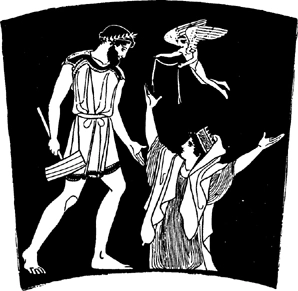He wrote: “The lonelier I am, the more of a recluse I become, the greater is my love for myths.”
WERNER JAEGER
Cambridge, Massachusetts
Harvard University
Summer 1946
I wish to express my gratitude to Miss Aileen Ward, of Radcliffe College, for her generous assistance in the revision of the English version of the text of my introduction.
W. J.
PART I

PROMETHEUS
HEAVEN and earth had been created. The sea ebbed and flowed between its shores, and fish frolicked in the waters; in the air sang winged birds, and the earth swarmed with animals. But as yet there was no creature in whose body the spirit could house and from there govern the world around it. Then down to earth came Prometheus, “Forethought,” a descendant of the ancient race of gods which Zeus had dethroned, a son of Iapetus, whom Gaea had borne to Uranus. Now Prometheus was crafty and nimble-witted. He knew that the seed of heaven lay sleeping in the earth, so he scooped up some clay, moistened it with water from a river, kneaded it this way and that, and shaped it to the image of the gods, the lords of the world. To give life to his earth-formed figure he took both good and evil from the core of many animals and locked them in man’s breast. He had a friend among the immortals, Athene, the goddess of wisdom, who marvelled at what this son of the Titans had created, and she breathed the spirit, the divine breath, into his creature which, as yet, was only half alive.
In this way the first men were made, and soon they filled the far reaches of the earth. But for a long time they did not know what to do with their noble limbs or the divine spirit which had been breathed into them. They saw, yet they did not see; they heard, yet they did not hear. Aimlessly they moved about, like figures in a dream, and were ignorant of how to profit from creation. They did not know the art of quarrying and cutting stone, of burning bricks from clay, of carving out beams from the trees they hewed in the forest, or of building houses with all these materials. Like scurrying ants they thronged in sunless caves beneath the surface of the earth. They did not discern the sure signs of winter, of spring decked with flowers, of summer rich in fruits. There was no plan in anything they did. Then Prometheus came to their aid. He taught them to watch the rising and setting of the stars, discovered to them the art of counting and of communicating by means of written symbols. He showed them how to yoke animals and make them share in man’s labor. He broke horses to the rein and wagon and invented ships and sails for journeying over the sea. And he concerned himself with all the other affairs of human life also. Formerly, a man who fell ill knew nothing of herbs, of what to eat or not to eat, what to drink or not to drink, nor did he have salves to ease his pain. For lack of physic men had perished wretchedly. But now Prometheus showed them how to compound mild remedies that would dispel every kind of disease. Then he taught them to foretell the future and interpreted dreams and signs for them, the flight of birds and the omens of offerings. He guided them to explore underground, so that they might find ore, iron, silver, and gold. In short, he introduced them to all the arts and comforts of living.
Now the gods in heaven, and among them Zeus, who had but lately deposed his father Cronus and established his own supremacy, began to notice this new creation, man. They were willing enough to protect him, but—in return—demanded that he pay them homage. In Mecone, in Greece, mortals and immortals met on a set day, to determine the rights and duties of man. At this assembly Prometheus appeared as man’s counsel, to see to it that the gods—in their capacity of protectors—did not impose too burdensome levies upon men.
On this occasion his cunning prompted him to trick the gods.
1 comment